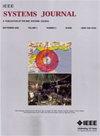GDOP-Based Low-Complexity LEO Satellite Subset Selection for Positioning
IF 4
3区 计算机科学
Q1 COMPUTER SCIENCE, INFORMATION SYSTEMS
引用次数: 0
Abstract
Low Earth orbit (LEO) satellites have recently received considerable attention because they can provide stronger signal power and better bandwidth availability than medium Earth orbit or geosynchronous orbit satellites. However, due to the limited processing capability of a receiver, it is difficult to utilize all the measurements of the available satellites in view when the number of satellites is large. With this motivation, selecting a subset of satellites that are in a good geometry relative to the receiver for precise positioning among a large number of available LEO constellations represents a challenging yet significant problem. Geometric dilution of precision (GDOP) is a metric that provides useful information about the relative geometry between satellites and a receiver. In this study, we put forth a novel GDOP-based satellite selection algorithm that uses efficient matrix decomposition and update rule. Simulation results show that the proposed algorithm achieves a GDOP performance close to the optimal exhaustive search-based schemes while greatly reducing the computational complexity. In particular, the computational complexity is verified in terms of flop counts as well as numerical evaluations.基于 GDOP 的低复杂度低地轨道卫星定位子集选择
与中地球轨道或地球同步轨道卫星相比,低地球轨道(LEO)卫星能够提供更强的信号功率和更好的带宽可用性,因此最近受到了广泛关注。然而,由于接收器的处理能力有限,当卫星数量较多时,很难利用视野中所有可用卫星的测量数据。因此,在大量可用的低地轨道卫星群中,选择相对于接收器具有良好几何形状的卫星子集进行精确定位是一个具有挑战性的重大问题。精度的几何稀释(GDOP)是一个度量指标,可提供卫星与接收器之间相对几何形状的有用信息。在本研究中,我们提出了一种基于 GDOP 的新型卫星选择算法,该算法使用高效的矩阵分解和更新规则。仿真结果表明,所提算法的 GDOP 性能接近基于穷举搜索的最优方案,同时大大降低了计算复杂度。特别是,计算复杂度在翻转次数和数值评估方面都得到了验证。
本文章由计算机程序翻译,如有差异,请以英文原文为准。
求助全文
约1分钟内获得全文
求助全文
来源期刊

IEEE Systems Journal
工程技术-电信学
CiteScore
9.80
自引率
6.80%
发文量
572
审稿时长
4.9 months
期刊介绍:
This publication provides a systems-level, focused forum for application-oriented manuscripts that address complex systems and system-of-systems of national and global significance. It intends to encourage and facilitate cooperation and interaction among IEEE Societies with systems-level and systems engineering interest, and to attract non-IEEE contributors and readers from around the globe. Our IEEE Systems Council job is to address issues in new ways that are not solvable in the domains of the existing IEEE or other societies or global organizations. These problems do not fit within traditional hierarchical boundaries. For example, disaster response such as that triggered by Hurricane Katrina, tsunamis, or current volcanic eruptions is not solvable by pure engineering solutions. We need to think about changing and enlarging the paradigm to include systems issues.
 求助内容:
求助内容: 应助结果提醒方式:
应助结果提醒方式:


